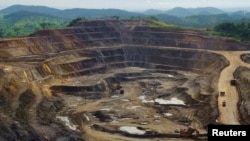The United States must refine its Africa policy with a focus on critical minerals, including boosting its diplomatic and commercial presence in African mining hubs, says a report from the Washington-based United States Institute of Peace, or USIP.
The group says the changes are needed to safeguard against export controls and market manipulation by geopolitical competitors.
The United States heavily relies on imports for many critical minerals for use in electric vehicle batteries and other applications such as cobalt, graphite and manganese.
“Especially concerning is that the United States is at or near 100% reliant on ‘foreign entities of concern’ — mainly the People’s Republic of China — for key critical minerals,” says the USIP report.
Despite the efforts of the Biden administration and Congress to support U.S. firms in African markets, progress remains measured, with no sign that China and Gulf State competitors are retreating. The USIP report recommends the U.S. government invests in “commercial diplomacy” in Africa.
For example, Washington should prioritize to fully realize the potential benefits of a memorandum of understanding signed with the Democratic Republic of Congo (DRC) and Zambia, following the U.S.-Africa Leaders Summit in December 2022 to jointly develop a supply chain for electric vehicle batteries.
The DRC produces more than 70% of the world’s cobalt, while Zambia is the world’s sixth-largest copper producer and the second-largest cobalt producer in Africa.
The USIP report also recommends that the U.S. increase the physical presence of diplomatic and commercial officers in mining centers. Given the proximity of the Congolese city of Lubumbashi to critical minerals, and the high priority placed on the country’s Lobito Corridor, USIP suggests reopening a U.S. consulate in Lubumbashi, provided security levels are acceptable.
In the mid-1990s, the United States closed its consulate in Lubumbashi following the end of the Cold War and the redirection of interests and resources. Lubumbashi is the capital of the mineral-rich Katanga Province and the second-largest city in the DRC.
Gécamines, the Congolese state mining company, is headquartered in the city, as are other mining companies.
Other policy recommendations include prioritizing and leveraging existing U.S. Agency for International Development programs to assist Africans with rule-of-law and fiscal transparency efforts, expanding membership of the Minerals Security Partnership to include African partners, as well as assisting African nations in building technical capacity in the mining sector.
Launched in June 2022, the Minerals Security Partnership, or MSP, is a collaboration of 14 countries and the European Union to catalyze public and private investment in responsible critical minerals supply chains globally.
U.S. officials say MSP members represent more than 50% of global gross domestic product and currently run 23 projects that involve the extraction and processing of cobalt, copper, gallium, germanium, graphite, lithium, manganese, nickel and rare earth elements.
“We need to scale up our critical mineral supply chains to deploy clean technologies more quickly, more effectively,” U.S. Secretary of State Antony Blinken told an MSP forum in Leuven, Belgium, earlier this month. “The demand is rising. By 2040, demand for lithium is expected to grow by more than 40%. Graphite, cobalt, nickel demand is set to grow 20 to 25 times.”




